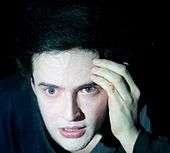Luiz Päetow

Luiz Päetow (born 1979) is a Brazilian theatre director, actor and playwright.
Early life and education
Päetow started his theatrical career, at age 11, taking part in several productions of the British Council Theatre Group in São Paulo, including plays by William Shakespeare, Federico Garcia Lorca, Nelson Rodrigues and, in the beginning, musicals by Cole Porter with guest director Nancy Diuguid. Later, he entered the Conservatory for Dramatic Arts and acted in Peter Weiss' Marat/Sade, Tennessee Williams' The Glass Menagerie, Arnold Wesker's The Kitchen, Bertolt Brecht's The Baden-Baden Lesson on Consent.[1]
Career
Between 1996 and 2001, Päetow became a central player for CPT (Centre for Theatre Research). During this period, he created the experimental Prêt-à-Porter. For this specific project, he directed, wrote and starred in five plays: Passengers, Under the Bridge, No Concert, Hours of Punishment and Wings of the Shadow.[2] In 1998, he worked as assistant director[3] to Daniela Thomas on Anton Chekhov's The Seagull, starring Fernanda Montenegro. In 1999, he worked on The Trojan Fragments[4] which received the Theatre Shell Award and the Art Critics' Association Prize. This production had its world-premiere at the Istanbul International Theatre Festival[5] [6] and was also presented at the second Theatre Olympics in Shizuoka. In 2000, he debuted as an opera director with Henry Purcell's The Fairy-Queen.[7]
In 2003, Päetow played the lead in the first Brazilian production of Sarah Kane's 4.48 Psychosis.[8] [9] After this, he presented, at the Volksbühne, the marathon of five plays Rebellion in the Backlands staged by Zé Celso.[10] In 2006, he created his first solo, entitled Plays, based on the lecture written by Gertrude Stein.[11] In the same year, he played the title role in Georg Büchner's Leonce and Lena, directed by Gabriel Villela, nominated as best actor by the Art Critics' Association Prize.[12] In 2008, he starred in two productions: Cascando and Words & Music by Samuel Beckett.[13] In 2009, he directed Music-Hall by Jean-Luc Lagarce, which he also translated and created the set/lighting designs, thus receiving the Theatre Shell Award.[14] In 2010, he created his second solo, the endless Abracadabra, nominated for the Shell Awards.[15] [16]
In 2011, Päetow premiered his third solo, Ex-Machines. The next year, he directed two dance pieces: Occurrences and Or Memory Reinvented, both recipients of the São Paulo City Hall Dance Sponsorship.[17][18] In 2014, he coordinated an artistic residency inside the ruins of an abandoned, historic movie theater.[19] In 2015, invited by Felipe Hirsch, he took part in Puzzle, performing poetry.[20]
References
- ↑ "interview in Portuguese". SP theatre magazine.
- ↑ "Prêt-à-Porter". uol.
- ↑ "Da Gaivota". itaucultural.
- ↑ "Fragmentos Troianos". sesc.
- ↑ "interview in Turkish". radikal newspaper.
- ↑ "Istanbul International Theatre Festival". iksv.
- ↑ "Ópera Purcell". caderno2 newspaper.
- ↑ "theatre article". folhasp newspaper.
- ↑ "Sarah Kane 4.48 Psicose". uol.
- ↑ "Krieg im Sertão". die tageszeitung.
- ↑ "Peças de Gertrude Stein". uol.
- ↑ "Leonce & Lena". folhasp newspaper.
- ↑ "Beckett's radio plays on stage". uol.
- ↑ "Music Hall: os íngremes caminhos da arte". época magazine.
- ↑ "Luiz Päetow Abracadabra". folhasp newspaper.
- ↑ "theatre review". bravo magazine.
- ↑ "Ocorrências". uol.
- ↑ "Ou Memória Reinventada". uol.
- ↑ "Cine Art Palacio". folhasp newspaper.
- ↑ "puzzle sesc". uol.